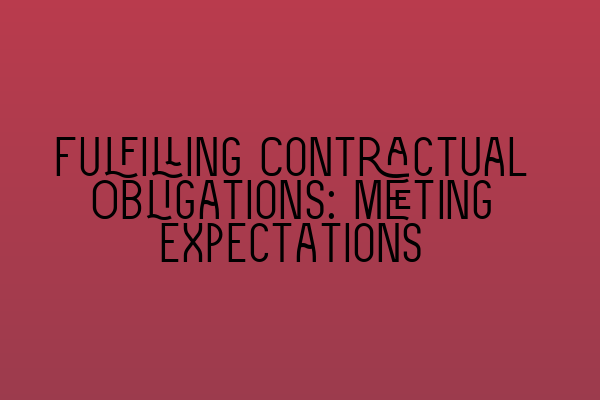Fulfilling Contractual Obligations: Meeting Expectations
Contracts form the backbone of business transactions, setting out the rights, responsibilities, and obligations of the parties involved. When entering into a contract, it is crucial to understand and fulfill the contractual obligations to ensure the smooth execution of the agreement and maintain a positive business relationship.
Understanding Contractual Obligations
Contractual obligations refer to the specific duties and responsibilities that each party must fulfill under the terms of the contract. These obligations can include completing certain tasks, delivering products or services, making payments, and complying with legal and regulatory requirements.
Failure to meet contractual obligations can have severe consequences, such as breaches of contract, legal disputes, financial penalties, and damage to reputation. It is therefore essential to take contract obligations seriously and strive to meet or exceed expectations.
Tips for Fulfilling Contractual Obligations
1. Clear Communication: Effective communication is key to ensuring that both parties have a shared understanding of the contract’s terms and obligations. Clearly communicate your expectations and requirements, and encourage open communication throughout the contract duration.
2. Thorough Planning: Develop a detailed project plan that outlines the specific tasks, timelines, and milestones required to fulfill the contractual obligations. This will help you stay organized and ensure that everything is completed in a timely manner.
3. Resource Allocation: Allocate the necessary resources, such as manpower, finances, and equipment, to fulfill the contractual obligations. Adequate resource allocation will help you meet deadlines and deliver the desired results.
4. Regular Monitoring and Evaluation: Continuously monitor the progress of the contract and evaluate whether you are meeting the contractual obligations. This will allow you to identify any potential issues or delays early on and take corrective actions.
5. Documentation: Keep thorough records of all communications, changes, and actions related to the contract. Proper documentation will help you demonstrate your compliance with the contractual obligations and safeguard your interests in case of disputes.
6. Flexibility: While it is important to fulfill the contractual obligations as agreed, be open to reasonable adjustments and modifications if circumstances change. Collaboration and flexibility can help maintain a positive business relationship and avoid unnecessary conflicts.
Conclusion
Fulfilling contractual obligations is crucial for successful contract performance and maintaining positive business relationships. By understanding the obligations, communicating effectively, planning thoroughly, allocating resources, monitoring progress, documenting actions, and being flexible when necessary, you can meet or exceed expectations.
For further assistance with the SQE (Solicitors Qualifying Examination), check out our related articles:
- SQE 1 Practice Exam Questions
- SQE 1 Practice Mocks FLK1 FLK2
- SQE 2 Preparation Courses
- SQE 1 Preparation Courses
- SRA SQE Exam Dates
